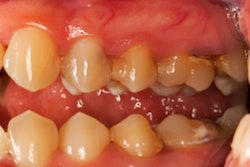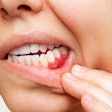
Patients who follow diets rich in plant-based foods but restrict refined grains and added sugars may be less likely to experience periodontitis, according to a study published recently in Nutrients.
Those with poor adherence to the Mediterranean diet or the DASH (Dietary Approaches to Stop Hypertension) diet more often had inadequate oral hygiene, like more plaque and higher bleeding on probing compared to those who followed these eating plans closely (Nutrients, November 21, 2021, Vol. 13:11, pp. 4144-4173). This is believed to be the second study to explore the relationship between individuals who follow DASH and Mediterranean diets and the prevalence of periodontal disease, the authors wrote.
"A higher adherence to the DASH diet as well as to the Mediterranean diet was significantly associated with lower odds to present periodontitis," wrote the group, led by Dr. Carolin Walther from the department of periodontics, preventive, and restorative dentistry at University Medical Center Hamburg-Eppendorf in Germany.
Diets at a glance
Based on research studies sponsored by the U.S. National Heart, Lung, and Blood Institute, the DASH diet is a balanced eating plan that can lower high blood pressure and improve cholesterol levels, reducing heart disease. The plan emphasizes eating fruits, vegetables, and whole grains. It includes low-fat dairy, fish, and poultry, and it limits foods high in sugar and saturated fats.
Studies also have shown that the Mediterranean diet, which is based on the way people eat in Italy, Greece, and other places that border the Mediterranean Sea, have been shown to prevent heart disease and stroke. The eating plan mostly includes fruit, vegetables, whole grains, nuts, seeds, and olive oil. Fish, dairy, and poultry are eaten in moderation, and red meat and sugar are consumed occasionally.
Both diets aim to reduce inflammation, which is a hallmark of periodontitis. Studies have shown that reducing oxidative stress, along with increasing consumption of antioxidants, has positive effects on gingival and periodontal inflammation because it modulates host immune responses, according to the authors.
To explore the relationship between periodontal disease and adherence to these diets, researchers conducted a prospective cohort study using data from the Hamburg City Health Study, which aims to gain insight into the initiation and development of major chronic diseases. The data from 6,209 participants were analyzed for this study.
The results suggest that adhering to DASH or Mediterranean diets lowers the risk of developing periodontitis. About 21% who had low adherence to the DASH diet were more affected by severe periodontitis compared to approximately 13% who strictly followed the eating plan. About 20% of those who adhered loosely to the Mediterranean diet experienced more severe gum disease compared to the approximately 19% who followed the diet more closely, Walther and colleagues found.
For both diets, patients who didn't adhere strictly to the eating plans presented with higher bleeding on probing and plaque indices. Those with lower adherence to the DASH diet had bleeding on probing indices of 8.70 compared to 7.1 in those with strict adherence. Plaque indices were 10.71 in those who didn't follow the diet closely and 6.25 in those who did.
Similarly, patients with low adherence to the Mediterranean diet had bleeding on probing indices of 9.99 compared to 8.93 in those with strict adherence. Plaque indices were 10.42 in those who failed to strictly adhere to the diet compared to 3.57 in those who did, the study's authors wrote.
Study limitations included that the study participants were white and middle-aged. Therefore, the findings cannot be generalized to younger people or other ethnicities, the authors noted.
More to learn
In the future, more clinical trials are needed to better understand the extent macro and micronutrients can affect the initiation and progression of gum disease, they wrote.
The study "identified a significant association between higher adherence to the DASH and Mediterranean diets and lower odds to be affected by periodontal diseases," Walther and colleagues concluded.



















